Sealife guideThe humphead wrasseCheilinus undulatus
Last updated on 09/04/2024 at 10:10 PM
the humphead wrasse, is a fish from the wrasse family (Labridae) in the order Perciformes. It is one of the oldest fish species still present in the world's seas and oceans, making it a true living fossil. It is commonly nicknamed in french the « Napoleon fish » or the « reef bison ».
Taxonomy
- Common name: Humphead wrasse, giant Wrasse
- French name: Poisson Napoléon, labre géant, bison des récifs
- Spanish name: Napoleón
- Scientific name: Cheilinus undulatus (Rüppell, 1835)
- Family name: Labridae
- Order name: Perciformes
- Class name: Actinopterygii
Description
The humphead wrasse typically measures around 24 inches but can grow up to 90 inches, making it the largest member of the wrasse family.
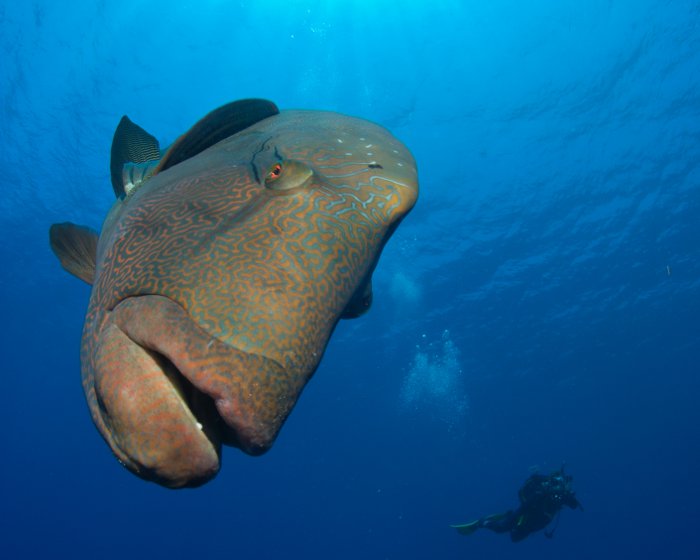
The humphead wrasse is characterized by the prominent hump on the forehead of the adult male, its large fleshy mouth, and its bulging eyes
This fish is characterized by the prominent hump on the forehead of the adult male, its large fleshy mouth and bulging eyes. The hump on its head, reminiscent of french emperor Napoleon’s bicorne hat, is the reason for its french nickname.
Its coloring is vibrant and dazzling, with electric blue marbling on a green background.
The humphead wrasse moves through the water primarily using its pectoral fins.
Geographic range
The humphead wrasse is found in the tropical waters of the Indian ocean, the Red sea and from southern Japan to the central islands of the Pacific ocean.
Habitat
The humphead wrasse prefers the shallow waters of coral reefs, often on the outer reef slopes. It is very common to see it along the edge of Australia’s Great Barrier Reef !
The humphead wrasse is a solitary, diurnal fish.
Diet
Carnivorous, it feeds on benthic invertebrates, mollusks, fish, sea urchins and can even ingest toxic species like boxfish and sea hares. It moves slowly and is therefore considered a harmless predator.
Reproduction
The humphead wrasse is a hermaphrodite ! It undergoes a sexual metamorphosis known as protogynous sequential hermaphroditism.
In simpler terms, the humphead wrasse is born female and later becomes male at sexual maturity with this change typically occurring around 15 years of age.
Did you know ?
The humphead wrasse can live up to 32 years !
Due to its late sexual maturity, the species is highly vulnerable to fishing. The humphead wrasse has been listed as an endangered species on the IUCN Red List since 1996 and its status was upgraded from « Vulnerable » to « Endangered » in 2004 !
The humphead wrasse is locally protected in Australia, the Philippines, the Maldives, Palau and New Caledonia.
Tips for observing
The humphead wrasse is not shy at all and easily approaches divers. It’s quite easy to swim near it as it puts on a show and often impresses with its size !
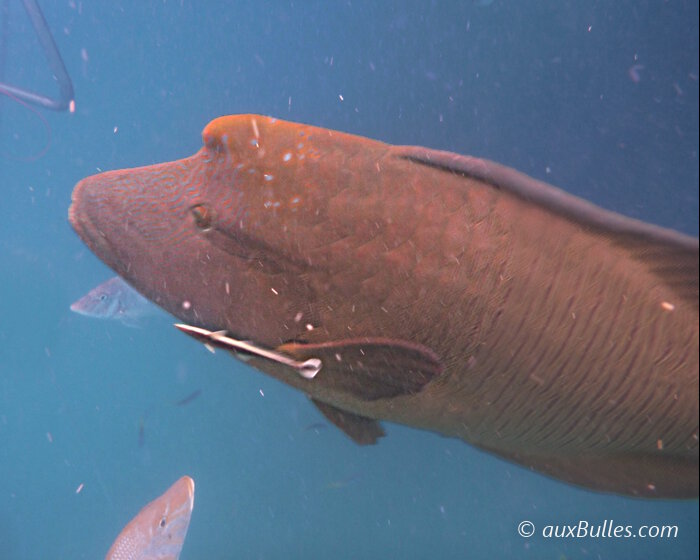
The humphead wrasse is a fish that typically measures around 24 inches but can reach up to 90 inches, making it the largest member of the wrasse family
Within the same genus
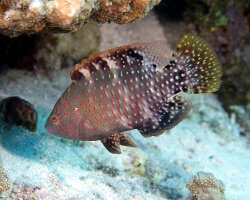
Abudjubbe wrasse
(Cheilinus abudjubbe)
(Cheilinus abudjubbe)
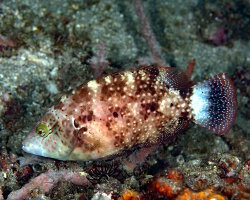
Floral wrasse
(Cheilinus chlorourus)
(Cheilinus chlorourus)
Within the same family
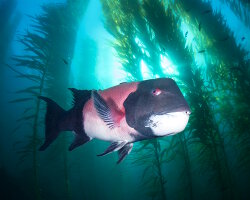
California sheephead
(Bodianus pulcher)
(Bodianus pulcher)
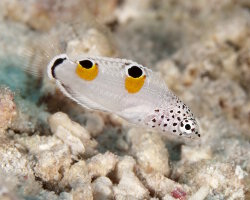
Clown coris
(Coris aygula)
(Coris aygula)

False leopard wrasse
(Macropharyngodon ornatus)
(Macropharyngodon ornatus)

Klunzinger's wrasse
(Thalassoma rueppellii)
(Thalassoma rueppellii)

Philippines wrasse
(Pseudocoris bleekeri)
(Pseudocoris bleekeri)
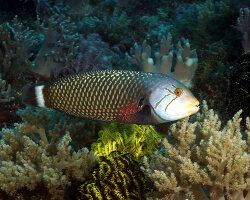
Rockmover wrasse
(Novaculichthys taeniourus)
(Novaculichthys taeniourus)

Spanish hogfish
(Bodianus rufus)
(Bodianus rufus)
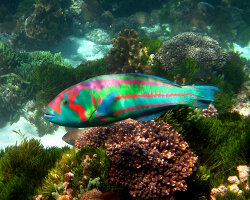
Surge wrasse
(Thalassoma purpureum)
(Thalassoma purpureum)
Discover also

Australian spiny gurnard
(Lepidotrigla papilio)
(Lepidotrigla papilio)
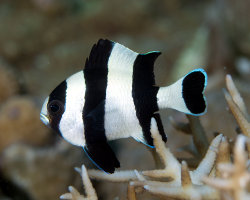
Blacktailed damselfish
(Dascyllus melanurus)
(Dascyllus melanurus)

Blue-axil chromis
(Chromis caudalis)
(Chromis caudalis)
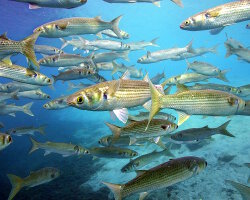
Flathead grey mullet
(Mugil cephalus)
(Mugil cephalus)
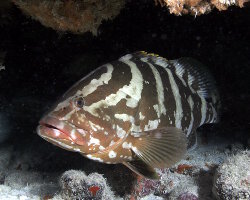
Nassau grouper
(Epinephelus striatus)
(Epinephelus striatus)
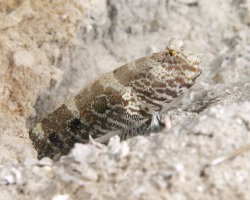
Target shrimp goby
(Cryptocentrus strigilliceps)
(Cryptocentrus strigilliceps)

Whitebelly damselfish
(Amblyglyphidodon leucogaster)
(Amblyglyphidodon leucogaster)

Yellow-ear angelfish
(Apolemichthys xanthotis)
(Apolemichthys xanthotis)
Our latestUpdates
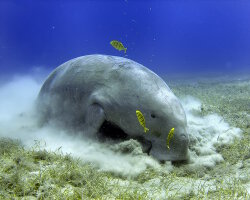
Friday, January 30th 2026
The dugong
Discover the dugong, a gentle “sea cow” of tropical waters. Learn about its habitat, diet, reproduction, morphology, and the threats facing this unique marine mammal.
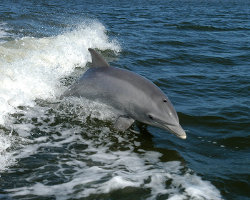
Friday, January 23rd 2026
Dolphins: ocean's smartest creatures
Discover dolphins, the ocean's geniuses: explore their intelligence, social behavior, sophisticated communication, species diversity and vital role in marine ecosystems.
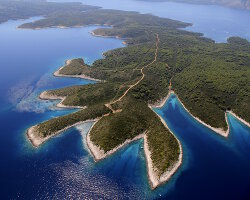
Friday, January 9th 2026
Hvar island
Hvar, a jewel of the Adriatic, captivates with its turquoise waters, wild coves and fragrant lavender fields. Between medieval villages, lively ports, and lush hills, Hvar island offers the perfect mix of relaxation, culture and breathtaking landscapes. Ideal for sun, sea and authentic experiences.
Photo of the Day
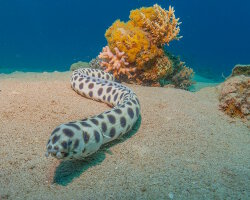
Serpentine maculée
(Myrichthys maculosus)
(Myrichthys maculosus)
